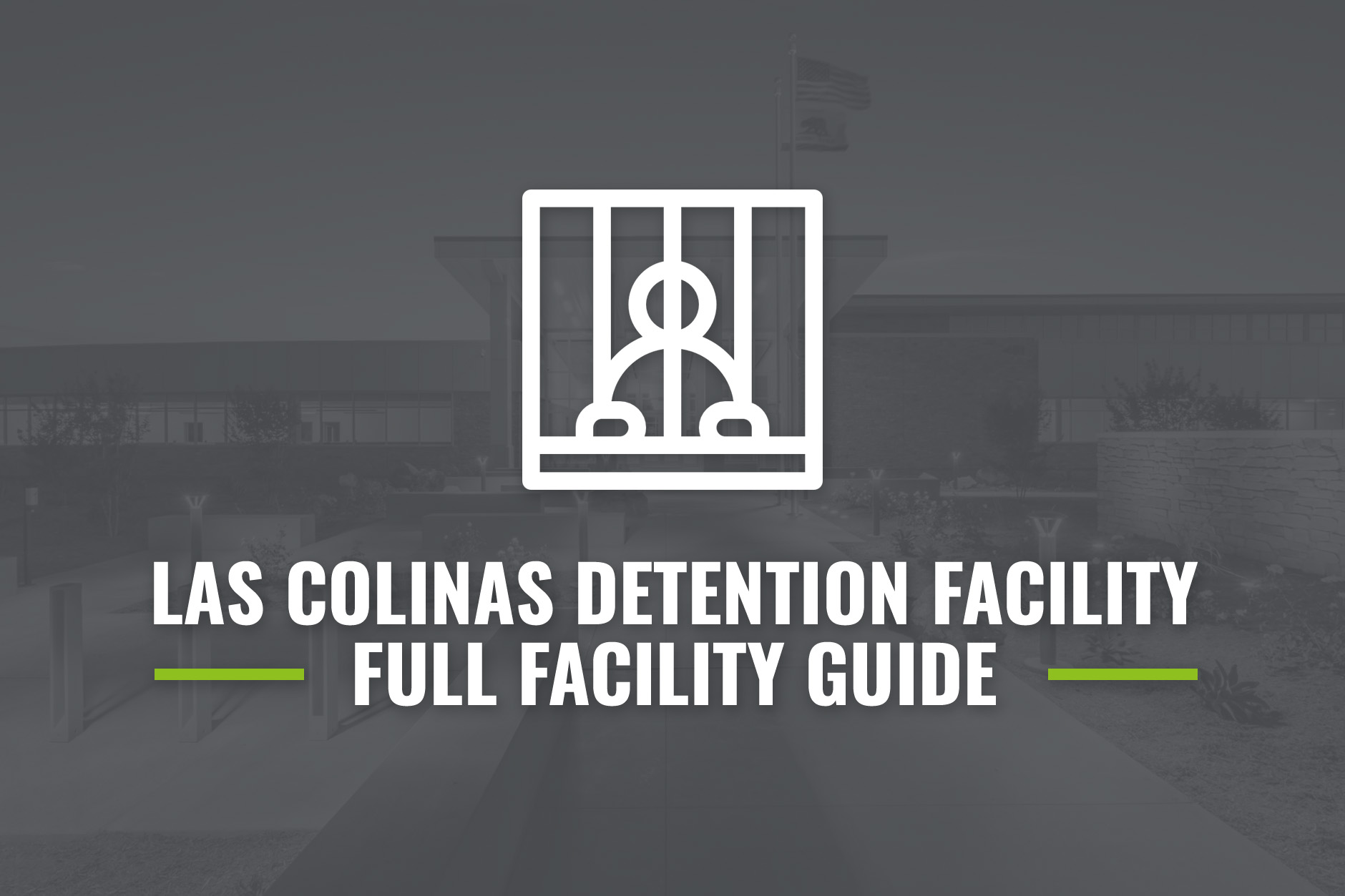Table of Contents
Quick Summary
Las Colinas Detention Facility is the primary intake center for female inmates in San Diego County. The facility has a capacity of 1,280 inmates and emphasizes rehabilitation through academic, vocational, and reentry programs. Las Colinas offers in-person and video visitation options, with specific scheduling and dress code guidelines. Communication with inmates can be maintained through phone calls, emails, letters, and financial support.
The information on this page is current as of the time of posting. You should check with the facility for the most up-to-date information. You can contact the facility by calling (619) 409-5000.
Las Colinas Detention Facility, located in Santee, California, is the primary intake center for female inmates in San Diego County. Established in 2014, this modern facility replaced the outdated 1967 structure, implementing innovative operational practices like Open Booking and Direct Supervision.
With a capacity of 1,280, Las Colinas focuses on creating a supportive environment for its inmates, offering various housing options and specialized care for those with medical or mental health needs. The facility is staffed by approximately 400 professionals, including officers and civilian employees, dedicated to providing comprehensive reentry services like academic and vocational programs to equip inmates with the skills needed for successful reintegration into society. Las Colinas emphasizes rehabilitation and support, ensuring inmates have access to the resources necessary to rebuild their lives.
Visiting Las Colinas Detention Facility
Visiting a loved one at Las Colinas Detention Facility is essential to maintaining connections and providing emotional support. The facility offers in-person and video visitation options, varying hours depending on the housing unit. Here’s a streamlined guide to help you navigate the visiting procedures and rules.
Visiting Hours and Scheduling Visits
Las Colinas Detention Facility categorizes its housing units to manage visitation effectively:
- House 1A/1B: In-person visits available, 60 minutes per visit.
- House 3C/3D: Video visits only, 30 minutes per visit.
- House 3B/3E/3F/3G/3H: Video visits only, 30 minutes per visit.
- House 4A/4B: Video visits only, 30 minutes per visit.
- House 5A/5B WPSU MOB: Video visits only, 30 minutes per visit.
In-person visits can be scheduled by calling (619) 409-5000 Wednesday through Sunday, from 6:30 a.m. to 6:00 p.m. They must be reserved at least 24 hours in advance and are available five days a week, with no visits on Tuesdays and Wednesdays. Each visit can include up to three visitors, including children. Visitors 18 and over must present a valid ID, and an adult with legal custody must accompany minors.
Video visitation is available seven days a week and lasts 30 minutes per session. Inmates are allowed two video visits per week. You must make reservations at least one day in advance, and you have to have an account before scheduling. Video visits are on a first-come, first-served basis, with no same-day visits allowed.
For the most current visiting schedules, visit the San Diego County Sheriff’s website.
Visiting Rules for LCDRF
If you are planning a visit to the LCDRF, make sure to arrive 30 minutes before your scheduled visit to check in.
Here’s what else you need to know to prepare for your visit:
- Identification Requirements: All visitors must present a valid, government-issued photo ID. An adult must accompany children under 18 and should have a school ID if available.
- Dress Code: Visitors should dress modestly. Prohibited attire includes revealing clothing, gang-related attire, and items that could be used to conceal contraband. Shoes and appropriate undergarments are required.
- Prohibited Items: You may not bring anything into the facility except your ID and car keys. Prohibited items include purses or bags, diapers, diaper bags, toys, food or beverages, pets, firearms, knives, drugs or alcohol, and cigarettes.
Communicating with Residents at Las Colinas
Staying in touch with loved ones during their time at the Las Colinas Detention Facility is important for maintaining relationships and providing support. Here’s how you can prepare and make the most of the available communication methods:
Phone Calls
Inmates can make outgoing calls but can’t receive incoming ones. Calls made through a third-party provider are billed to the inmate’s account or charged as collect calls to the recipient. All calls are monitored.
To place calls:
- Set Up an Account: Create a prepaid account with the facility’s phone service provider.
- Understand Call Restrictions: Calls are generally limited to 15 minutes. Check the facility’s website for details.
- Manage Costs: Be aware of the costs for placing calls, as rates vary.
Emails and Letters
Regular communication through emails and letters helps maintain important connections.
- Sending Emails: Use the facility’s email service provider to send electronic messages. These are printed and delivered to the inmate.
- Writing Letters: When sending traditional mail, include the inmate’s full name, booking number, and housing unit. Avoid including stickers, stamps, or inappropriate content, as all mail is inspected.
Sending Money and Care Packages
Providing financial support and care packages can greatly enhance an inmate’s comfort and well-being. These contributions help cover essentials and make their stay more bearable.
- Commissary Accounts: Inmates can use funds to purchase personal items and snacks. Add money through online transfers, money orders, or in-person deposits at the facility.
- Care Packages: These must comply with strict regulations and be sent through an authorized vendor. Approved items typically include hygiene products, snacks, and reading materials. Be sure to check the facility’s guidelines for specific items allowed.
Maintaining contact through these methods helps provide essential support and comfort to residents at Las Colinas.
Bail and Release Procedures
Navigating the bail and release procedures at Las Colinas Detention Facility is crucial for securing an inmate’s timely release. Understanding the steps involved and the available options can help streamline the process and reduce stress for everyone involved.
Bail can be posted in several ways to secure the release of an inmate:
- Cash Bail: Pay the entire bail amount in cash at the facility. The amount will be refunded once the case is resolved, provided the inmate attends all court appearances.
- Bail Bonds: You use a licensed bail bond agent to post bail. You pay a non-refundable fee. Usually, 10% of the total bail amount, and the agent posts the full bail.
- Property Bond: In some cases, property can be used as collateral for bail. This process involves legal documentation and court approval, making it more complex and time-consuming.
Release Procedures
It’s important to know the available bail options and the steps involved in securing an inmate’s release from the Las Colinas Detention Facility is important.
You can post bail in a few ways. One option is to pay the full bail amount in cash at the facility, which is refunded once the case is resolved, provided the inmate attends all court appearances. Another option is using a licensed bail bond agent, where you pay a non-refundable fee, usually about 10% of the total bail amount, and the agent posts the full bail. Property can also be used as collateral for bail, but this process involves legal documentation and court approval, making it more complex and time-consuming.
After bail is posted or if the inmate is eligible for release for another reason, the facility will begin processing their release, which can take several hours. The inmate will then retrieve personal belongings that were confiscated upon arrival. If someone else is picking up these belongings, they must have proper identification and authorization. Inmates may also receive information on post-release support services, such as housing, employment, and counseling resources, to help them reintegrate into society.
Inmate Well-being and Rights
Ensuring the well-being and rights of inmates at Las Colinas Detention Facility is a top priority. The facility offers services to address the medical, mental health, and legal needs of inmates, ensuring they receive appropriate care and support during their incarceration.
Health and Wellness Services
- Medical Care: Inmates have access to care for acute and chronic conditions, including regular check-ups, emergency care, and specialist consultations.
- Mental Health Services: Counseling, psychiatric evaluations, treatment plans, group therapy, and crisis intervention are provided for inmates with mental health needs.
- Substance Abuse Programs: Counseling and support groups help inmates with substance abuse issues, promoting recovery.
Inmate Rights and Legal Support
- Legal Representation: Inmates have the right to legal representation and can contact their attorneys for confidential legal visits.
- Access to Information: Inmates can access legal resources and information about their cases, and they have the right to be informed about the charges against them and participate in their defense.
- Grievance Procedures: Inmates can file complaints if they feel their rights are violated, and facility staff will review and address these concerns.
Las Colinas Detention Facility strives to create a supportive and fair environment for all inmates by providing comprehensive health services and upholding inmates’ rights.
Facility Conditions and Community Impact
Las Colinas Detention Facility is designed to provide inmates with a safe and supportive environment while minimizing the impact on the surrounding community. The facility focuses on humane conditions, rehabilitation, and positive social reintegration.
Las Colinas offers various educational and vocational programs aimed at rehabilitation. Inmates can participate in academic classes, job training, and reentry services, all designed to prepare them for successful reintegration into the community.
The facility minimizes its impact on the local community through strict oversight and community involvement. Regular inspections, transparency initiatives, and collaboration with local organizations ensure responsible operation. These efforts help maintain community safety and trust, ensuring Las Colinas positively contributes to the region’s overall welfare.
Have Questions? Contact Las Colinas Detention Facility
Navigating the criminal justice system can be challenging, especially with a loved one at Las Colinas Detention Facility. You can contact the facility by calling (619) 409-5000.

Attorney David Rubin
Attorney David Rubin is a criminal defense and personal injury lawyer based out of Carlsbad, CA. Attorney Rubin serves clients throughout San Diego County and has been practicing law for over a decade. When not working, David can be found surfing, attending CrossFit classes, or eating asado.
 (619) 719-1087
(619) 719-1087



